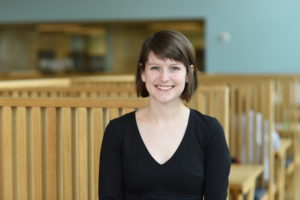Nominations are now being accepted for the NDSA 2020 Innovation Awards.
Samantha Abrams won a 2016 Innovation Award in the Future Steward category. Samantha was recognized for her work with the Madison Public Library and its Personal Archiving Lab as well as her initiative to create innovative projects and classes. She is currently the Web Resources Collection Librarian for the Ivy Plus Libraries Confederation.
What have you been doing since receiving an NDSA Innovation Award?
Since May 2017, I’ve been the Web Resources Collection Librarian (read: Web Archivist) for the Ivy Plus Libraries Confederation, based at Columbia University. (When I received the award, I was the Community Archivist at StoryCorps.) In support of the Confederation, I manage the Web Collecting Program, a collaborative collection development effort to build curated, thematic collections of freely available, but at-risk, web content in order to support research at participating Libraries and beyond. Right now, we have 21 public collections on topics ranging from elections, to webcomics, to video games, to vaccination, and just about everything in between. We’re also working on a Coronavirus collection that will document social responses to the virus — music videos, art, writing, and more — in countries all over the world.
I’ve also been teaching Introduction to Web Archiving at the University of Wisconsin-Madison’s iSchool — one course for Master’s students, and one for Continuing Education students. I’ve engineered the course to be an overview of web archiving concepts: students pick a theme around which to collect, write a collection policy, use Archive-It, Conifer, and Perma.cc to crawl identified websites, and then, at the end of the course, make the case — or not! — for web archiving at their institution. It’s been a lot of fun!
What did receiving the NDSA Award mean to you?
I received the Future Steward award in 2016, right before I graduated with my Master’s degree in Library and Information Studies, which felt like a huge vote of confidence, personally — like I had picked the right path, and that I should keep at it. Receiving the award also motivated me to get more involved with both the National Digital Stewardship Alliance and the Digital Library Federation — I served as a member of the Planning Committee for the DLF Forum in 2019, and as a member of NDSA’s Innovation Working Group (which selects Innovation Award winners) in both 2019 and 2020. Both are excellent organizations with which to work!
What efforts, advances, or ideas over the last few years have you been impressed with or admired in the area of digital stewardship?
I still deeply admire the work of Documenting the Now — after the murder of George Floyd, Documenting the Now launched Archivists Supporting Activists, which connects archivists and memory workers willing to volunteer their time and expertise with with activists interested in documenting their vital work. In the same vein, the Blackivists — ‘a collective of trained Black archivists who prioritize Black cultural heritage preservation and memory work’ — recently released a call to action to ‘ethically and comprehensively archive’ both the Black experience during the ongoing Covid-19 pandemic and the current uprisings brought about by racist police violence against Black people. Both organizations — and others, like Project Stand — encourage archivists to ethically and carefully engage with the communities they serve and document, and to be deliberate in their work as they collect and attempt to make sense of current events. I also remain deeply inspired by so many of my students — their creativity and willingness to approach web archiving and digital preservation with a careful eye is refreshing, and constantly recenters and reframes my own day-to-day work.
The 2020 NDSA Agenda discusses a number of web and social media archiving challenges, one of them being how labor-intensive much of the work is. How do you make visible your labor? Do you have any tips on advocating for additional resources for web archiving?
Oh, this is such a good question. I’m lucky because my position with the Confederation is full-time — I spend 40 hours per week on web archiving, and nothing else. (I’m also deeply indebted to Jean Park, the Program’s Bibliographic Assistant, who helps with metadata creation, quality assurance, and just about everything in between.) I make sure I’m direct with supervisors and colleagues about how long it will take to make our collections public — I can’t just drop a bunch of sites into Archive-It and make them available to researchers the next day: there’s metadata creation, running crawls, and quality assurance. And it’s quality assurance that takes the longest: I’ve easily spent a few hundred work hours since April performing quality assurance on the Confederation’s forthcoming Coronavirus collection — does this video play? Was this spreadsheet captured? Do the images look like their counterparts on the live site? Our goal, Program-wise, is to view each crawled website at least once before it’s made public — and sometimes that means a site won’t be made public for weeks or months. (I also have my students spend a week on quality assurance, which I know they don’t love — but it prepares them to go back to their own supervisors and directors and really push for the resources — and time — they’ll need to adequately support a fleshed-out web archiving program at their own institutions.)
Is there anything we didn’t ask you that you want to add?
We’re still accepting nominations for the 2020 Innovation Awards! Please help acknowledge and celebrate a new cohort of innovators by submitting worthy nominees — or by nominating yourself — via this form. Nominations are due by Friday, September 4, 2020.
